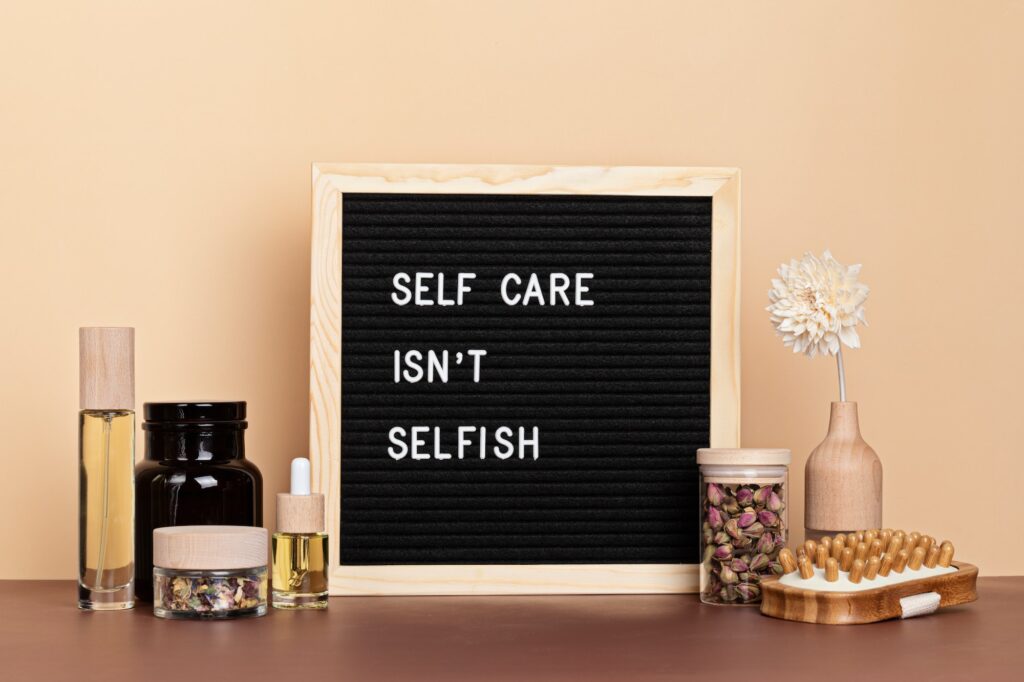We live in a world where we’re constantly striving to improve ourselves and meet the expectations of others. We’re bombarded with messages that we need to be perfect and that our self-worth is tied to our achievements, appearance, and status.
Getting caught up in this cycle of self-criticism and self-doubt is easy, which can lead to anxiety, depression, and other mental health issues. But the truth is, learning to love yourself is essential to living a happy and fulfilling life.
Self-care and compassion are two practices that can help us cultivate self-love and acceptance. In this article, we’ll explore what self-care and compassion mean, why they’re essential, and provide tips for how to love yourself.
What is Self-Care?

Self-care is taking care of yourself physically, emotionally, and mentally. It involves making choices that prioritize your well-being and give you a sense of inner peace and balance.
Self-care can include exercising, eating healthy foods, getting enough sleep, meditating, spending time in nature, and engaging in activities that bring you joy and fulfillment.
Taking care of yourself is crucial to your overall health and well-being. Self-care is not selfish, nor is it a luxury. It’s a necessity.
Neglecting self-care makes you more likely to experience burnout, stress, and physical and mental health problems.
Why is self-care important?
Self-care is important for several reasons.
Firstly, it helps us to manage stress. Stress can negatively impact our health and well-being, and self-care can help reduce its effects.
When we engage in self-care activities, we activate our parasympathetic nervous system, which promotes relaxation and reduces the activity of our sympathetic nervous system, which is responsible for the “fight or flight” response.
Secondly, self-care can improve our physical health.
When prioritizing self-care, we are more likely to engage in healthy behaviors such as eating nutritious foods, getting enough sleep, and exercising regularly. These behaviors can reduce the risk of chronic diseases such as diabetes, heart disease, and obesity.
Thirdly, self-care can improve our mental health.
Engaging in self-care activities can help to reduce symptoms of anxiety, depression, and other mental health conditions. Caring for ourselves makes us more likely to feel confident, motivated, and resilient.
What is Self-Compassion?
Compassion is showing kindness, understanding, and empathy towards oneself and others. It involves recognizing that we’re all imperfect and deserving of love and acceptance, regardless of our flaws and mistakes.
Self-compassion is essential for developing self-love and acceptance. It involves treating yourself with the same kindness, understanding, and empathy that you would offer a friend or loved one. Self-compassion means acknowledging your flaws and mistakes without judgment or criticism and being gentle with yourself as you navigate life’s challenges.
Why is self-compassion important?
Self-compassion is important for several reasons. Firstly, it can improve our mental health. Research has shown that self-compassion is associated with reduced symptoms of anxiety, depression, and stress.
Secondly, self-compassion can improve our relationships with others. When we are kind and understanding towards ourselves, we are more likely to extend that same kindness and understanding to others. We are also less likely to be critical or judgmental towards others.
Finally, self-compassion can improve our overall well-being. Treating ourselves with kindness and acceptance makes us more likely to feel happy, content, and fulfilled.
Tips for Self-Care and Compassion
Here are some tips for incorporating self-care and compassion into your daily routine:
Practice mindfulness
Mindfulness involves being present and non-judgmental of your thoughts and emotions. By practicing mindfulness, you can cultivate self-awareness and better understand your needs and desires.
Mindfulness can also help you develop self-compassion by allowing you to observe your thoughts and emotions without judgment or criticism.
Prioritize your physical health
Taking care of your physical health is essential to your overall well-being. Eat healthy foods, exercise regularly, get enough sleep, and avoid unhealthy habits such as smoking and excessive drinking.
Prioritizing your physical health can also help you feel more confident and energized, boosting your self-esteem.
Engage in activities that bring you joy and fulfillment
Engaging in joyful and satisfying activities can help you cultivate a sense of purpose and meaning.
This can include hobbies, volunteer work, spending time with loved ones, or pursuing a career that aligns with your values and passions.
Set healthy boundaries
Setting healthy boundaries involves learning to say no when necessary and prioritizing your own needs and well-being.
Learning to say no can involve declining invitations or requests that don’t align with your values or priorities or simply focusing on your goals and interests.
Healthy boundaries can involve limiting your time, energy, and resources and being clear about your boundaries with others.
Setting healthy boundaries can help you reduce stress and avoid burnout, and it can also help you develop self-respect and self-compassion.
Practice self-compassion
Self-compassion involves treating yourself with kindness and understanding, even in moments of difficulty or failure.
Offer yourself words of encouragement or comfort, reframe negative thoughts, and be gentle with yourself as you navigate life’s challenges.
Practicing self-compassion can help you cultivate self-love and acceptance, and it can also help you develop greater resilience and emotional well-being.
Connect with others
Connecting with others is essential for developing a sense of belonging and support. Spend time with loved ones, join social groups or clubs, or seek out therapy or support groups.
Connecting with others can help you feel seen, heard, and understood, and it can also provide you with valuable perspectives and insights.
Practice gratitude
Cultivating gratitude involves focusing on the positive aspects of your life and expressing appreciation for them.
Keep a gratitude journal, express gratitude to others, or simply take a few moments each day to reflect on what you’re thankful for.
Practicing gratitude can help you develop a more positive mindset and increase your overall happiness.
Set aside time for self-reflection
Reflecting on your thoughts, feelings, and experiences can help you gain clarity and insight into yourself.
You can journal, meditate, or spend some quiet time alone. Self-reflection can help you develop self-awareness and deepen your understanding of your needs and desires.
Practice self-acceptance
Self-acceptance involves embracing your flaws and imperfections and recognizing that they’re a natural part of being human.
This can involve reframing negative thoughts, letting go of self-judgment, and learning to appreciate yourself just as you are.
Practicing self-acceptance can help you cultivate greater self-love and reduce feelings of shame and self-doubt.
Take breaks and rest when needed
Rest and relaxation are essential for your physical and mental well-being. Practice taking breaks throughout the day, scheduling regular vacations or days off, or simply permitting yourself to rest when needed.
Taking breaks and rest can help you reduce stress, avoid burnout, and increase your overall productivity and happiness.
Engage in creative expression
Creative expression can help you tap into your inner creativity and express yourself in new and meaningful ways.
Painting, writing, dancing, or playing music and other forms of creative expression can help you reduce stress, increase your emotional well-being, and cultivate greater self-awareness.
Practice self-forgiveness
Self-forgiveness involves letting go of past mistakes and learning to forgive yourself for them.
Acknowledging your role in the mistake, expressing remorse, and committing to learning from the experience will help you forgive yourself.
Practicing self-forgiveness can help you cultivate greater self-compassion and reduce feelings of guilt and shame.
Seek out social support
Seeking out social support from friends, family, or a therapist can provide valuable emotional support and guidance.
This can involve talking through your thoughts and feelings, receiving advice or feedback, or simply feeling heard and understood.
Seeking out social support can help you feel less alone and more connected and increase your overall well-being.
Practice mindfulness-based stress reduction techniques
Mindfulness-based stress reduction techniques such as deep breathing, progressive muscle relaxation, or guided imagery can help you reduce stress and increase your overall sense of calm and well-being.
These techniques can be practiced anywhere, anytime, providing you with inner peace and balance.
Take care of your emotional health
Taking care of your emotional health is essential for your overall well-being. Seek therapy or counseling, learn coping skills for managing stress and anxiety, or express your emotions healthily and productively.
Taking care of your emotional health can help you increase your resilience and develop greater self-awareness.
Find ways to relax and unwind
Relaxing and unwinding can help you reduce stress and increase your overall sense of well-being. Take a warm bath, listen to calming music, practice yoga or meditation, or spend time in nature to help you feel more centered and grounded in the present.
Prioritize your mental health
Prioritizing your mental health involves seeking treatment or support for mental health issues such as depression, anxiety, or addiction.
Talk to a mental health professional, join a support group, or explore self-help resources. Prioritizing your mental health can help you increase your overall well-being and improve your quality of life.
Practice forgiveness toward others
Practicing forgiveness towards others involves letting go of anger, resentment, or hurt towards people who have wronged you in the past.
This can involve acknowledging your emotions, expressing empathy for the other person, and committing to moving forward positively.
Practicing forgiveness can help you reduce negative emotions and cultivate greater inner peace and compassion.
Incorporating Crystals in Your Self-Care Routine
Crystals can be a powerful tool for self-care and compassion. The energy and vibrations of crystals can positively impact physical, emotional, and spiritual health. Here are some tips for incorporating crystals into your self-care routine.

Choose crystals that resonate with you
There are many different types of crystals, each with unique energy and properties. When selecting crystals, choose ones that resonate with you and align with your goals for self-care and compassion.
Use crystals during meditation
Incorporating crystals into your meditation practice can help deepen your connection to their healing energy. You can hold a crystal in your hand or place it on a specific area of the body while meditating, or keep it nearby to enhance the energy of your meditation space.
Place crystals in your environment
Placing crystals in your home or work environment can help promote a sense of calm and balance. You can put them on a desk or table, in a bowl, or even wear them as jewelry.
Use crystals during self-care rituals
You can incorporate crystals into your self-care rituals, such as bathing or wearing a face mask. Placing crystals in your bath water or using crystal-infused skincare products can help promote relaxation and rejuvenation.
Seek guidance from a practitioner
If you’re new to crystal healing or want to deepen your practice, consider seeking guidance from a qualified practitioner. They can help you select the right crystals for your needs and advise how to use them effectively.
Love Yourself!
Learning to love yourself is a journey requiring practice, patience, and persistence.
Self-care and compassion are essential for developing a healthy relationship with yourself. When you prioritize your well-being and show kindness and understanding, you cultivate self-love and acceptance. This, in turn, can lead to greater resilience, happiness, and inner peace.
Self-care and compassion can also benefit your relationships with others. When you’re kind to yourself, you’re more likely to be kind to others. When you prioritize your well-being, you’re likelier to show up as your best self in your relationships, leading to greater connection and intimacy.
By incorporating self-care and compassion into your daily routine, you can cultivate greater self-love and acceptance and develop a healthier relationship with yourself.
Remember that self-care and compassion are not selfish, nor are they a luxury. They’re essential for your overall health and well-being and can help you live a happier and more fulfilling life.
So, take time to prioritize your needs and well-being, and remember to be kind and gentle with yourself as you navigate life’s challenges.